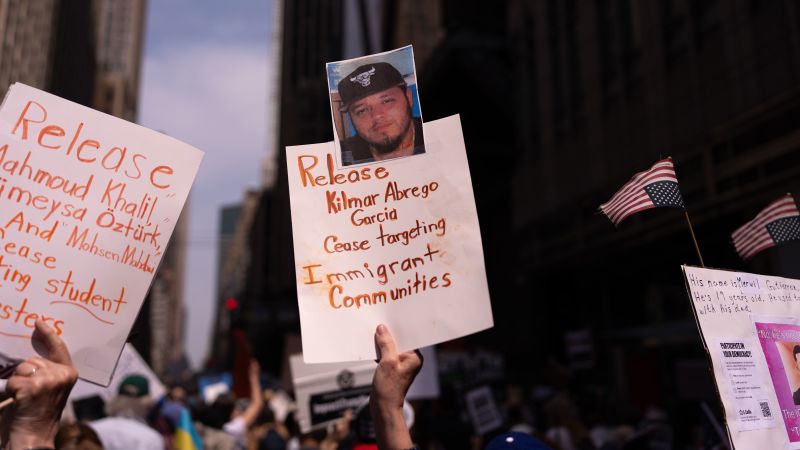CNN
—
The federal judge overseeing the case of Kilmar Abrego Garcia appeared extremely frustrated Friday by the Trump administration’s efforts to thwart a search for answers on what officials are doing to facilitate his return from El Salvador.
The lengthy hearing in Greenbelt, Maryland, unfolded a month after US District Judge Paula Xinis allowed for expedited fact-finding to help determine what officials are doing to comply with her directive that the government work to bring Abrego Garcia back to the US.
But since then, repeated stonewalling from the Justice Department and officials in the administration have complicated those efforts. Part of that resistance has been the invocation of several privileges, including state secrets, to avoid turning over written discovery and to keep officials from answering under oath questions from Abrego Garcia’s attorneys.
But Xinis appeared highly skeptical that a declaration from Secretary of State Marco Rubio that apparently explained why the state secrets claim was being made was sufficient enough to support the invocation.
“Where I am right now is this affidavit is sufficiently unclear,” Xinis told a DOJ attorney at one point. “This is basically ‘take my word for it.’ And I’m not saying at the end of the day you won’t be able to make the privilege. What I’m saying is there’s not enough there there.”
“I’m asking – really, in good faith – for the Executive Branch to do a little more to show its work for why the privilege works,” the judge said.
In an order later Friday, Xinis said she would unseal Rubio’s declaration and asked that it be updated with additional details justifying the privilege invocation. She also said she was giving Abrego Garcia’s attorneys permission to depose additional Trump administration officials.
Courts have long recognized the ability of the federal government to block secret information from being used as evidence – and they have often been deferential to those requests, giving past presidents wide leeway to put information off limits. But decades-old Supreme Court case law requires judges to determine whether the privilege has been properly invoked.
Justice Department attorneys have said in court papers that Rubio’s declaration explained that providing the information sought by Abrego Garcia’s attorneys “would harm the United States’ foreign relations and national security because it would be viewed as a breach of trust and discourage El Salvador and other foreign states from working cooperatively with the United States in the future.”
During Friday’s hearing, DOJ attorney Jonathan Guynn repeatedly argued that the Rubio declaration was adequate.
“I think there’s a lot more meat on the bone than you’re giving this declaration credit for,” he told her.
But the judge wasn’t satisfied by what Rubio offered, describing the non-public filing as “very, very general” and saying that she must “have something to review.”
Xinis, an appointee of former President Barack Obama, was also frustrated that the Justice Department had only produced the declaration from Rubio in the state secrets bid given the fact that the three officials who have been deposed work for the Department of Homeland Security, not his department.
She firmly rejected an argument from Guynn that the Rubio declaration covered the DHS officials and that a declaration from DHS Secretary Kristi Noem in a separate immigration case pending in Washington, DC, could be counted on in her court.
“I’m really quite stunned,” she said at one point. “Get an affidavit or not. Right now, you have no (state secrets) privilege” over the three officials. The judge said she would likely allow the Justice Department to get a separate declaration for the DHS officials that she would similarly scrutinize.
And she made clear that if she would allow for such additional submissions, they must be made without delay.
“In this court, it won’t take months,” she sternly told Guynn.
It’s possible that Xinis could order the government to give her an “in camera,” or confidential, review of the information at issue so she can better decide whether the privilege invocation is justified.
At one point, Guynn said the administration recently got an update from officials in El Salvador on Abrego Garcia. He said the Maryland father of three had put on some weight – an apparent attempt to undercut claims that he was being treated poorly in the Central American country’s prison system.
Guynn spent much of Friday’s hearing arguing that the government has complied with Xinis’ orders, something that an attorney for Abrego Garcia said was far from accurate.
“My head is spinning, your honor, from what I just heard from the government,” the attorney, Andrew Rossman, said at one point. He told the judge that he didn’t think it would be fair for her to give the government more time to submit additional declarations backing up their state secrets claim given the fact that they submitted several — including from DHS — in the DC case.
“I cannot in good conscience – with my duties to my clients – consent to giving them a second bite at the apple,” he told Xinis.
This story has been updated with additional details.

